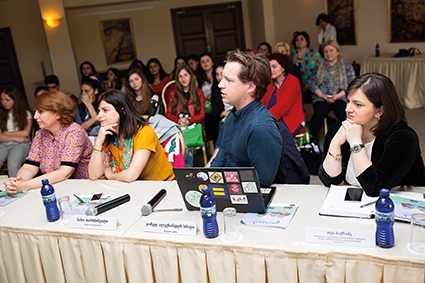Water for The Poor, or The Georgia Community WASH Initiative
The human right to water entitles everyone to sufficient, safe, acceptable, physically accessible and affordable water for personal and domestic use. However, despite the abundance of water resources in Georgia, around thirty thousand people, most of them children, annually suffer from diseases associated with poor water quality and supply, sanitation and hygiene. Limited access to water is a problem for multi-ethnic communities and other communities countrywide, resulting in marginalization, conflict and inequities.CENN, with support from the European Union, is addressing this issue in the Dmanisi, Marneuli, Tetritskaro and Tsalka municipalities of the Kvemo Kartli region, and Akhmeta, Sagarejo and Lagodekhi municipalities of the Kakheti region. These communities have a considerable number of vulnerable groups, among them ethnic and religious minorities as well as IDPs (including ecomigrants), that are facing poverty and a high incidence of female discrimination. They lack integration, education, financial resources and political support. Limited access to Water Supply and Sanitation services disproportionally affects local women and essential factors contributing towards gender equality and the realization of women’s rights.
The ‘Georgia Community WASH (Water, Sanitation and Hygiene) Initiative’ is implemented by CENN with support provided by the Global Water Challenge and The Coca-Cola Foundation (TCCF).
As part of the ongoing project, two informative programs were implemented and competitions organized- one for youth and one for media. From 13-14 February 2019, national and regional journalists were invited on a media tour about Water, Sanitation and Hygiene (WASH) as a human right. The first day of the event took place in the Bulachauri Green Center. The training included topics related to WASH and human rights, while the second day of the media tour was devoted to field visits in schools, kindergartens and healthcare centers of the Kvemo Kartli and Kakheti regions. Participants had a chance to see the challenges and meet representatives of the local governments.
After the media tour, the participants were invited to participate in a media competition by creating and submitting media products (TV programs, articles, blogs, etc.) dedicated to the presented theme of the tour.
The media tour was organized by CENN within the framework of the following projects: ‘Georgia Community WASH Initiative’ and ‘Water for the Poor,’ supported by donors Global Water Challenge (GWC) and the EU. Along with other activities, the projects plan to increase WASH Council capacities according to their needs. The main objectives of the projects are to promote healthcare and suitable living conditions for socially vulnerable communities, prevent discrimination, provide access to water, protect and promote the right to health and to adequate living standards of citizens in vulnerable multi-ethnic communities of Georgia, and to improve the well-being of the women and youth in vulnerable multi-ethnic rural communities of the Kakheti and Kvemo Kartli regions through the reduction of discrimination and introduction of Water, Sanitation and Hygiene (WASH) standards. The initiative aims to reduce the lack of capacity of vulnerable groups and community institutions to advocate for their rights to health and adequate living conditions and make positive changes to the absence of knowledge, attitude and life skills on WASH, non-existent or out-dated WASH infrastructure and limited or inadequately allocated state financing for fair provision of safe water, sanitation and hygiene conditions.
To raise awareness of the above issues among Georgia’s youth, in January 2019, five teams of five students participated in WASH's Winter Camp. Together with other thematic trainings, participants attended a two-day training on proposal writing. Following the camp, CENN announced a small grant competition for participants to raise awareness in their communities. Within the scope of the competition, four applications were submitted.
On May 2, CENN hosted the awards ceremony for the media and grant competitions within the WASH projects.
During the event, the winners were announced for the categories of “best multimedia product” and “best TV reportage.” Nino Vartapetiani from TV Borjomi won the multimedia category and Tamar Bubashvili from TV Imedi won the best TV reportage, while 20 students from four schools in Kvemo Kartli and Kakheti were given grants to implement informational and educational campaigns in their communities in order to help increase access to clean water.
Representatives of the EU delegation, journalists from local and national media outlets, school students, teachers and directors; Ministry of Healthcare representatives, the Public Defender of Georgia and other stakeholders attended the awards ceremony.
“The European Union in Georgia advocates for the right of access to safe drinking water and sanitation as one of the main priority areas for sustainable development goals,” said Dominika Skubida, International Aid/Cooperation Officer for Civil Society and Democracy, Delegation of the EU to Georgia. “Protection of water quality and human health is one of the objectives of the EU-Georgia Association Agreements.”











